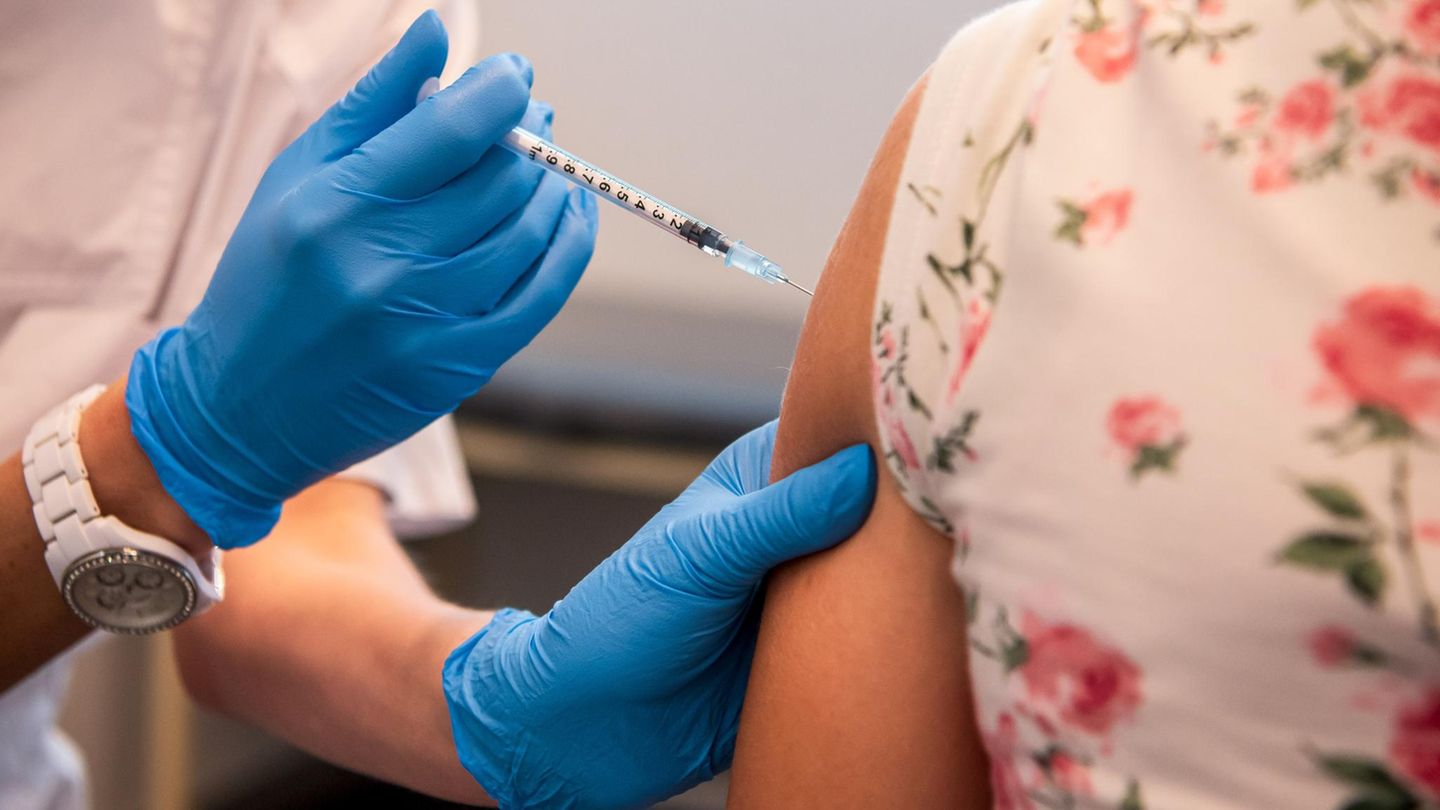Fears about declining vaccination protection, a more contagious virus variant and people with weak immune systems: politicians want to minimize risks with booster vaccinations before autumn. But there are also counter-arguments.
From September, certain groups in Germany should be able to get a booster vaccination against Covid-19. The federal and state health ministers decided on this a few days ago, but the Standing Vaccination Commission (Stiko) has not yet issued a recommendation. There are also questions and answers.
How long does the vaccination against Corona last?
Experts have not yet been able to give an exact answer. However, it was foreseeable that, above all, the protection against infection would wane after some time. It is known that other respiratory diseases make it difficult to induce a permanently effective defense on the mucous membranes by means of a vaccination administered into a muscle. However, the protection against serious illness is considered to be longer lasting; according to previous knowledge, this also applies to the delta variant.
Who is the refreshment offer aimed at?
According to the decision, a booster vaccination should be offered in care facilities, integration assistance facilities and other facilities with vulnerable groups – usually at least six months after completion of the first series of vaccinations. Patients with a weakened immune system who live at home or those in need of care living at home should receive the offer from their doctor.
According to the decision, people who have been fully vaccinated with vector vaccines – two doses of Astrazeneca or a Johnson & Johnson syringe – should be given the opportunity to be vaccinated with an mRNA vaccine from Biontech / Pfizer or Moderna. This should be possible in vaccination centers, with doctors or in the company. In clinics such as the Berlin Charité, the offers for employees are starting.
What are the advantages of a refresher?
Politicians justified the step with preventive health care and initial study results that indicated that certain groups could increasingly experience a reduced or rapidly waning immune response. This applies in particular to relevant immunocompromised people as well as to the very elderly and those in need of care, it said. The background is: the immune system of old people does not react as well as that of younger people. The actually high effectiveness of the vaccines is not fully effective with them. It can be similar for people with certain pre-existing conditions.
What does the Stiko say?
She deals with the topic, but has not yet seen the data basis necessary for an official recommendation. This involves questions such as: Is the measurable immune response in the laboratory decreasing? Do vaccinated people experience more illnesses in real life? Which group would benefit from the booster? Regarding Israel’s decision to offer third vaccinations for the elderly, Stiko boss Thomas Mertens recently said that nothing speaks against a state acting like this out of a duty of care – even without evidence. Data on declining vaccination protection from Israel, for example, had been criticized in part because of possible bias.
What role does the delta variant play?
The delta variant, discovered in India and now also predominant in this country, is significantly more contagious than its predecessor – the US health authority CDC compared it to chickenpox. It is feared that it will spread in autumn and winter. Compared to earlier variants, a significantly higher amount of virus is found in the blood of Delta infected people. In addition, Delta has to some extent the ability to escape antibodies from vaccinated and convalescent people. It is assumed that against this background, the likelihood of infection also increases for vaccinated people.
Are booster vaccinations a Corona peculiarity?
No. Second and third vaccinations after one and six months are a tried and tested vaccination scheme, for example for children’s vaccinations, said Christine Dahlke from the Department of Clinical Infection Immunology at the University Medical Center Hamburg-Eppendorf (UKE). It is well known that lowered antibody levels can be boosted in this way.
Why should there also be a booster after vector vaccines?
The resolution provides for this as a preventive measure regardless of age and previous illness. The background is probably that different types of vaccine also cause different immune responses. There is evidence that after two doses of Astrazeneca, the level of neutralizing antibodies is slightly lower than after an mRNA vaccination and also lower than after a cross-vaccination, said Dahlke. With regard to the infection process, the refreshment could therefore soon be useful. It is assumed, however, that Astrazeneca has a good effect on the second arm of the immune response, the so-called T cells. These are important to protect against serious illness.
Which vaccines are used?
For the time being, there are no vaccines available specifically for Delta or other new variants, even if several manufacturers are already working on them. From the point of view of the Charité vaccine expert Leif Sander, the vaccines that are already available “probably significantly increase” the immune response.
Can a third dose pose risks?
It could be that a shorter interval to a previous vaccination leads to stronger vaccination reactions, said Sander. Although these are uncomfortable, they are usually harmless. If, as now planned, at least six months have passed since the previous vaccination, he does not worry about increased vaccination reactions. In the elderly, the tolerance was already very good. But it is of course important to closely monitor the third-party vaccination.
Can’t you measure whether someone is still immune?
Laboratory tests on antibody levels are possible – however, these do not allow any direct conclusions to be drawn about the protective effect in humans. So far, there is no defined threshold value that could tell whether someone is immune or protected from a severe course. Not all vaccinated people form measurable levels of antibodies – but that doesn’t mean that you are not protected, said Dahlke. This is due to the memory cells, which raise the antibodies back to a sufficient level in a very short time after an infection. Those cells can be extensively examined for studies, for example, but this is not an option in everyday life.
Is there enough vaccine available for booster vaccinations?
Several rich countries now believe that the refresh is possible, but globally there is no question of sufficient vaccine. A few days ago, the World Health Organization (WHO) called for booster vaccinations to be temporarily stopped while many poorer countries are still waiting for vaccination doses. Booster vaccinations that have already started should be suspended and plans for them put on hold until at least the end of September, until at least ten percent of people in all countries of the world have been vaccinated, according to the demand. Charité expert Sander also spoke of an “ethical dilemma”. The third vaccinations in this country can be justified medically.
Will continual refreshments be necessary every six months?
Experts do not assume that this is the case. We know from other vaccines that a late booster stimulates the memory cells again so that one or two years, hopefully more, no longer need a vaccination, said Dahlke. According to experts, the virus is also unlikely to change as quickly later – when most people are immune: Therefore, after a few years, the Charité researchers concluded their study in the specialist magazine “Virus” with a longer shelf life of the vaccines Evolution”.




